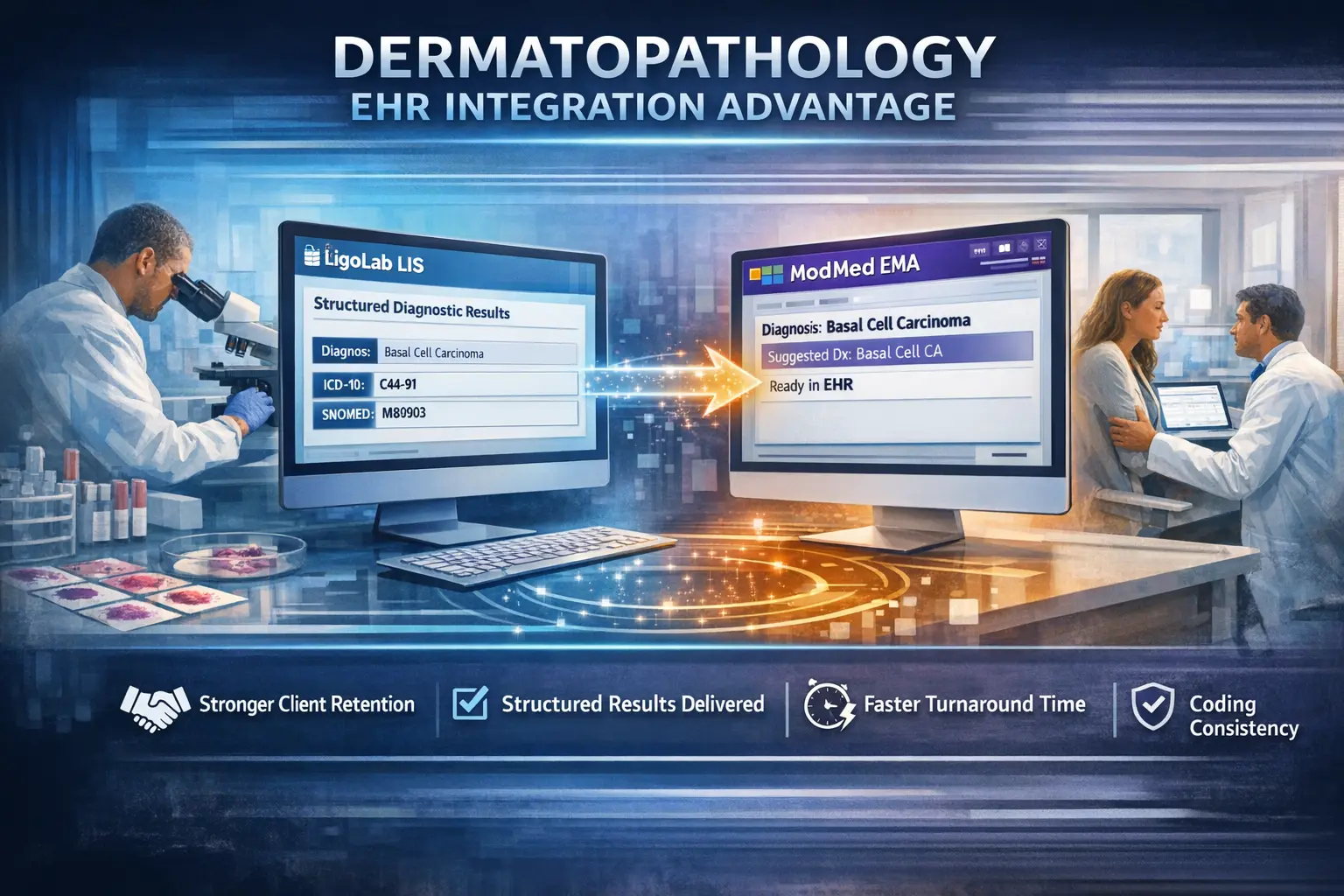Blog
The Best Laboratory Information System Companies and the Advantages They Offer to Their Laboratory Clients
November 17, 2025
As we rapidly move through the year, pathology groups and clinical laboratories throughout the country continue to look for examples of laboratory information systems (LIS software) or laboratory information management systems (LIMS) that will help them navigate within an industry that’s in constant flux so they can become more productive, compliant, and profitable.
Medical labs continue to grapple with fee reductions, unique payer requirements, increased regulations, claim denials, a lack of skilled medical laboratory technicians, and consolidation, all of which make running an efficient and profitable lab operation extremely difficult.
To thrive while addressing these serious challenges, laboratory operators should align their businesses with laboratory information system companies and LIMS vendors who understand the obstacles and can help them meet and surpass today’s challenges while preparing for future success.
Discover More: What You Need to Know Before Contracting with a Laboratory Information System (LIS) Company

LIS vs LIMS - What’s the Difference?
LIS systems and lab LIMS are closely related software solutions, and the terms are often used interchangeably. Both serve as critical diagnostic tools that help laboratories manage testing, streamline workflows, and oversee informatics.
Medical LIS systems are designed to prevent clinical errors and support laboratory workflow management and diagnostic testing within a healthcare environment. Basic laboratory information system functions include tracking, storing, and managing patient demographics and the clinical tests associated with each patient’s specimen individually. Even the most basic lab information system will also generate and send reports with test results to physicians and other healthcare providers.
Discover More: Manage Complex Processes and Streamline Operations with LigoLab's Laboratory Information System Solutions
Lab LIMS are primarily designed for analytical testing environments other than in a clinical environment. In fact, lab information management system software is often associated with research laboratories and the pharmaceutical and manufacturing industries. LIMS lab management software typically focuses on the sample rather than the patient. That said, a modern lab LIMS features many of the same modules and components as a modern medical laboratory information system, thus further blurring the distinction between the two applications.
Like the best laboratory information system software, the best LIMS solutions regularly include computerized provider order entry, specimen barcoding, sample tracking, rules and automation, customizable reporting, interfaces with other laboratory instrumentation (including electronic health records), as well as patient and provider portals, and can be either server-based or cloud-based.
Discover More: A Comparative Analysis: Laboratory Information Management Systems (Lab LIMS) vs. Laboratory Information Systems (LIS Systems)

The Basics: What Laboratory Information System Vendors and LIMS Providers Offer Their Customers
Medical lab operators, motivated by a desire to differentiate in the marketplace, scale their operations, and become more profitable, are turning to laboratory information system companies and LIMS vendors that offer comprehensive and flexible pathology lab reporting software solutions that address this list of common problems that prevent efficiency and growth:
- Issues with reliability and performance
- Insufficient functionality (lacking modules and features)
- Lack of scalability (current system can’t keep up with demand)
- Difficult to configure (requires external vendor support)
- Legacy report formats and delivery options that don’t cater to customer needs
- Inefficient laboratory workflow management and manual processes
- Specimen handling and sample tracking workflow that lacks a robust chain of custody, uniquely barcoded specimens, and verification at specimen security checkpoints
- Information on processes, bottlenecks, and compliance is difficult to access or inaccessible
- Need for intradepartmental and external (EHRs, APIs, instruments, state registries, laboratory billing services) interoperability
Trends in Clinical Laboratory Management
Modern medical lab operators need more than basic sample tracking; they require scalable, future-ready pathology lab software platforms that combine flexibility, automation, and interoperability. The right clinical laboratory management system supports both technical operations and laboratory revenue cycle management (lab RCM), enabling labs to improve patient outcomes, expand service offerings, and maximize collections.
The best LIS laboratory information system companies and lab LIMS vendors can offer infinitely configurable laboratory software systems that meet the specific needs of each customer, regardless of the lab’s size or the diagnostic discipline it pursues.
When evaluating a laboratory information system/lab LIMS software, it’s essential to consider how well it scales with new interfaces and expanding services. The most effective platforms not only adapt to growth but also enhance workflows, lower labor costs, and boost profitability.
The best LIS/lab LIMS:
- Manage all departments and operations on one platform with no data silos
- Automate complex processes and reduce manual touchpoints
- Create market differentiation to expand services and acquire new business
- Maximize interoperability and efficiency
- Eliminate human errors and lost specimens
- Produce fully customizable reports
- Provide multiple options for report delivery
- Monitor quality control and quickly identify, troubleshoot, and resolve problems
- Improve turnaround times
- Obtain real-time, easily accessible business analytics (dashboards, stats, and dynamic reports) from every department
Taking the best trends in LIS systems and LIMS lab management software even further, when the best LIS and best LIMS are also paired with a robust laboratory revenue cycle management software that provides end-to-end laboratory billing solutions for all laboratory activity, these operations gain a major advantage that comes with starting the RCM cycle at order inception rather than after the case has been finalized.
Add further front-end lab billing support like verification, eligibility, and scrubbing components, and these medical labs can drastically increase accepted claim submissions on the first pass while decreasing denials and compliance risk.
How to Justify the Cost of Modern Laboratory Information Systems and Lab LIMS?
Modern laboratory information systems/laboratory information management systems help organizations remain relevant, competitive, and profitable. These laboratory software systems eliminate the potential for mistakes and bottlenecks while operating more effectively by heavily automating core processes that would otherwise be performed manually.
Examples of modern medical LIS systems that produce advanced diagnostic lab software solutions will always include the LigoLab Informatics Platform, a pathology lab software and laboratory workflow management solution that creates end-to-end efficiency for all lab ops with its all-in-one LIS software infrastructure.
The level of efficiency users gain from the LigoLab platform isn’t possible with homegrown or legacy laboratory information systems.
By upgrading to the LigoLab platform, clinical laboratories and pathology groups gain the functionality, reliability, and scalability needed to increase lab productivity for anatomic pathology, clinical laboratory, molecular diagnostics, genomics, and toxicology testing environments.
Discover More: A Closer Look at LigoLab’s Commitment to Innovation

Only the Best Laboratory Information System Companies and LIMS Vendors Offer Complete Pathology Software Solutions
So what are the things to be wary of when lab operators begin exploring new LIS laboratory information system software or new lab LIMS options for their respective laboratories?
The questions to ask include…
- Can the LIS lab software or lab LIMS be configured to meet the lab’s immediate needs, and is it also scalable?
- To change any configuration within the LIS system/lab LIMS, is external development required, or can changes be made by laboratory personnel?
- Following implementation, will the laboratory be charged by its lab vendors for support requests?
- How often is the lab information system/lab information management system updated?
- How are laboratory personnel supported and trained during LIS lab or lab information management system implementation and beyond?
The best laboratory information system vendors/LIMS providers take full responsibility for all of a customer’s information system needs by connecting and integrating every department and lab process and removing information silos.
They also offer infinitely configurable and ever-evolving modules, and then take it further by empowering lab users to make configuration changes without help from external sources.
They also provide customers with deep laboratory expertise, proven best practices, and hands-on training, both during implementation and beyond, backed by responsive 24/7 service and support.
In summary, when buying a modern LIS lab or lab information management system, these operators shouldn’t settle for a rigid and boxed pathology software solution.
Instead, they should look for a strategic partner that can assist, tailor, and advise their laboratory team when help is needed, while also providing innovative and adaptable pathology management software that can grow with the business as it grows and thrives.
Take the next step; empower your lab with scalable LIS software solutions from LigoLab, trusted industry leaders.
Speak with a LigoLab Product Specialist!







